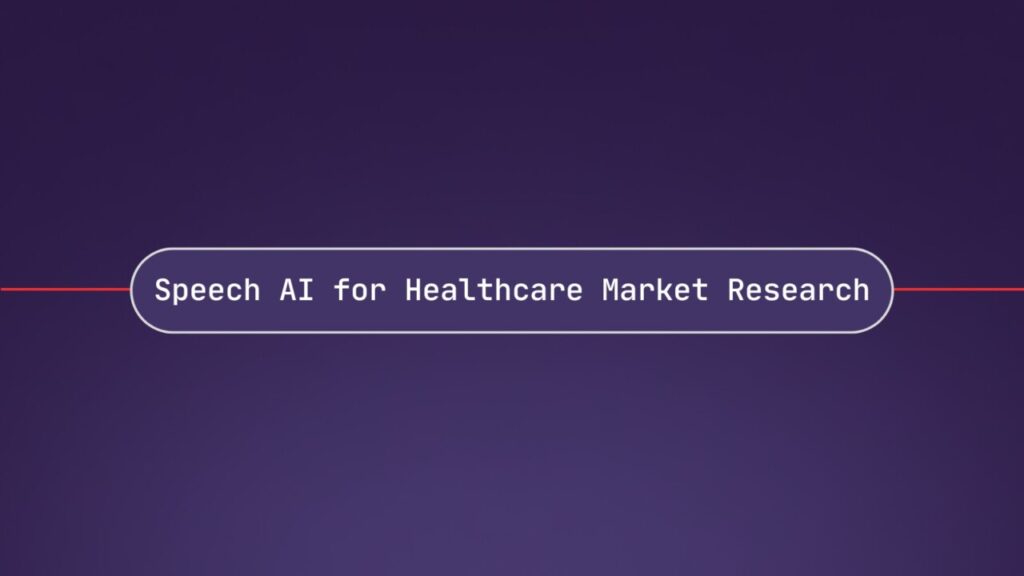Companies continue to integrate Speech AI technology to turn voice data into insights, and it’s paving the way for revolutionary new research techniques. Companies like GRG Health are improving traditional methods of gathering and analyzing healthcare market insights by leveraging AI to streamline data processing to provide faster (and more accurate) insights.
These AI systems can sift through massive amounts of data to uncover patterns and trends that would take human analysts much longer to discover with the naked eye.
Below, we’ll walk you through some of the ways individuals and companies are using Speech AI to transform and improve healthcare market research.
4 Ways to Use Speech AI for Healthcare Market Research
Speech AI helps researchers gain deeper insights, improve the accuracy of their data, and accelerate the time from research to actionable results. Here are different ways they’re using Speech AI to make it happen:
1. Improve data analysis through searchable audio filesÂ
Speech AI can convert audio content from interviews, focus groups, and panel discussions into searchable text. This lets healthcare researchers quickly find specific topics, quotes, or discussions within extremely large datasets without manually sifting through hours of recordings.
Searchable media speeds up the review process and makes it more accurate—no more guesswork or relying on your memory of interviews and conversations. Researchers can use simple search queries to find what they’re looking for and compare responses across different sessions to identify patterns or outliers in the data.
2. Organize, Categorize, and Annotate for Deeper Insights
Searchable media enables better organization and archiving of research data, allowing researchers to tag and categorize audio segments based on topics or keywords. This creates a well-organized repository that is easily accessible for future studies or follow-up research.
Beyond basic tagging and categorization, Speech AI can also help with more nuanced parameters, such as speaker identification, sentiment, and thematic content. Researchers can quickly pull up all relevant discussions on specific topics, compare how certain themes have evolved over time, or retrieve all mentions of a particular medication or treatment across multiple studies.
Transcribing video and voice files—such as interviews, case studies, patient surveys, and expert panels—allows for deeper analysis and easier insight sharing. Once converted into text, researchers can perform text analytics to identify common themes, the frequency of specific terms, and sentiment—important factors for understanding patient experiences and opinions.
Annotating transcripts with metadata such as timestamps, speaker labels, and emotional tone gives researchers a comprehensive understanding of the context and nuances of spoken interactions. This level of detail helps analyze communication patterns, gauge participant engagement, and understand emotional undertones that might influence participant responses.
3. Understand the patient experience betterÂ
While transcriptions, searchable media, and archives can accelerate research time, researchers still have a lot of data to sift through. AI-powered highlights and analysis can expedite this process by distilling hours of interviews and discussions into concise summaries and highlight reels that focus on the most important information.
For example, AI can automatically generate summaries of patient feedback sessions, highlighting common concerns or praises regarding treatments or healthcare services. It can also detect emotional cues to gauge patient satisfaction and emotional responses—and this can provide deeper insights into patient experience than even traditional analysis methods.
AI-powered analysis can track the frequency and context of specific medical terminology or health-related topics discussed over time. This analysis helps researchers understand how opinions or knowledge about certain health conditions or treatments evolve.
4. Secure sensitive information with AI features like PII redaction
Speech AI technologies provide robust solutions for maintaining data privacy and compliance through features like Personally Identifiable Information (PII) redaction. PII redaction automatically detects and removes sensitive information such as names, phone numbers, addresses, and other identifying details from transcripts and audio files.
Implementing PII redaction helps researchers and companies maintain the confidentiality of participant data while still using valuable insights gained from their research. This automated process guarantees all sensitive information is filtered out without manual intervention, reducing the risk of human error and data breaches.
For example, in patient interviews and surveys, PII redaction can scrub the data of any personal identifiers to make it safe for further analysis and sharing within the research community. This allows healthcare organizations to comply with regulations such as HIPAA while still benefiting from the rich data collected through their research.
PII redaction features help you confidently handle massive volumes of sensitive data without worrying about compromising anyone’s private information. This protects your participants and improves the credibility and trustworthiness of your findings.Â
Example of Accelerating the Research Process
Marvin is one example of how companies can use AI to revolutionize market research. Marvin is a qualitative data analysis platform that has integrated advanced AI models to accelerate and improve its research processes.
At the heart of Marvin’s platform are powerful AI models, particularly for automatic speech recognition and understanding, designed to provide highly accurate audio and video data transcriptions. However, the platform’s application extends beyond transcriptions. Users can use AI to organize, tag, summarize, and analyze their data, helping them uncover insights.
Marvin also provides users with a PII Redaction model to automatically filter out personally identifiable information from the data. This helps companies maintain compliance and user privacy protection while allowing maximizing data extraction.
It’s not just a collection of AI features, though. Marvin’s platform helps researchers reduce the time spent on data analysis by 60%, freeing up their time for deeper analytical tasks and strategic decision-making. This speeds up the research process and provides higher-quality insights healthcare companies can trust.
Speech AI is an AI system that is reshaping healthcare market research today. And it’s not exclusive. With speech recognition and understanding technologies, you can build streamlined research applications that improve the quality of your data and insights.
Whether you’re looking to automate transcription, improve data analysis, or secure sensitive information, you can transform your research workflows with Speech AI.
Try it for yourself in the AssemblyAI API Playground.
Source: Read MoreÂ

